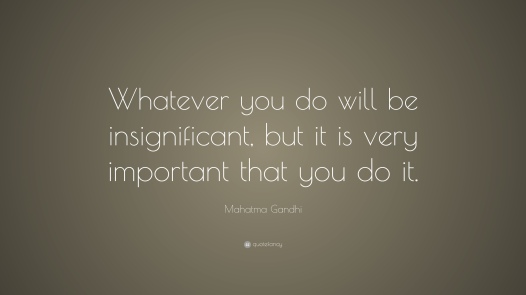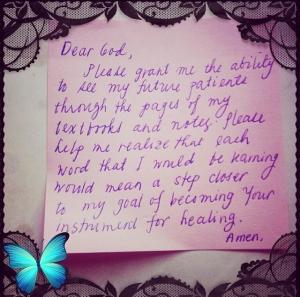We are approaching November which means we are nearing the first half of clerkship. A lot of my co-clerks have been posting a lot of their ‘firsts’. First IV insertion, first NGT insertion, first extraction, first OR, or sometimes sadly, first birthday away from our families. It is an interesting thing– to have the wonders and simple joys of a child over our accomplishments. Some of us feel like stage moms of ourselves who are proud of every baby step we make. And yet after grueling hours of our duty days, we still see patients die despite all our efforts, we still get insulted by superiors, patients and their relatives, nurses, hospital staff– practically everyone, we still get hours of demerits for being human, we still get soaked in all shit possible (literally and figuratively). Clerkship is indeed a funny thing. You do tons of jobs everyday but somehow, you do not feel as purposeful as you thought you would be.
Clinical clerks have a very ambiguous role in the hospital. This is also why we get to have jobs that overlap those of doctors’, nurses’, medtechs’, even maintenance staff’s works. Patients and their relatives usually have no idea what our roles are and would call us random titles, ‘Doc’, ‘Nurse’, ‘Miss/Sir’, ‘Ate/Kuya’, or simply, ‘Hoy’. I personally respond to any name though. I remember this one exhausting Pedia duty and the patient’s Dad personally called me from our space. I thought it was urgent since he took so much effort in looking for me so I felt alarmed and rushed to their room only to be asked whether I knew how to fix the electric fan because the air from it was not reaching his son. I wanted to cry and laugh during that time. It was not because I was annoyed with the Dad. I understood that he really wanted the best for his kid (especially since the baby was his first child). It was not because I was thought to be a maintenance personnel, or because I felt degraded, or because my tiny rest was disturbed, or because I really had no idea how to fix the problem. It was because I felt like an odd teenager who did not seem to fit in. Being a clerk feels like being a double for many, many characters in a movie. But when the credits roll, you are not named as any character, but simply a double. No one really remembered what you did or that you were in the movie at all.
I may sound like I am whining but believe me, I am not. I think that this is the primary rule of clerkship: Do not complain. It sucks to go around the whole hospital doing monitoring for countless times to the point that you hear Korotkoff sounds even while you are sleeping. It sucks that despite reading piles of books and notes for the last three years, your most used phrases are ‘Yes, noted, Doc.’ and ‘Sorry, Doc.’ when you are speaking with residents and consultants. It sucks to be so excited over badass surgical techniques that you have seen in Grey’s Anatomy in the OR only to be told to not scrub in and keep on talking so as not to let the surgeon fall asleep. It sucks to be reminded over and over again how you know nothing. It sucks to be told that well, you simply suck at whatever you are doing. But despite everything, I do not think complaining will make me a better doctor. The work gets tiring, yes. But I always remind myself that what sucks the most is not any of these. What sucks the most is the feeling of being sick and helpless. This alone makes me able to forget my childish thoughts and I am reminded that I am there to help alleviate that worst feeling in the world.
A lot of times, i just sit in one corner and wonder if we are of any loss to the hospital. Honestly, as I have mentioned, everything in our job description is not unique. All of our works can be done by other hospital staff. If we do not exist, someone else can do the histories, physical examinations, monitoring, insertions, extractions, etc. There is not a thing that only a clinical clerk can do. Without us, the staff will have more work to do but it does not necessarily mean that the hospital will collapse. There are many hospitals without clerks anyway. But these five months made me realize what makes a clerk’s role special is not the work itself but the enthusiasm and sincerity in doing it. I am not saying that other hospital staff are doing their jobs half-heartedly, but after working for so long, these things do not excite them any longer. Clerks who do not have much experiences are often more eager to do these things. The feeling of being entrusted tasks makes us more careful with our work. Our works have sincerity. And to me, that is something that we should all be proud of. It is disheartening how a lot of patients would reject our services because of our age and lack of experience. But I really do hope that people would grow to trust us more because our lack of experience is our driving force to make sure that we are always ready to give our best.
I am convinced that I have learned a lot over the last five months and I am still very much excited to learn a whole lot more. I believe that what I know now is not even worth one page of my imaginary book of learning in Medicine. We are writing nothing more than one full sentence of that book. It feels like a long way to go but then all great books are written that way: the first part is always the hardest. It is not because the climax is there or because it is the most complicated part of the story. It is because it creates the ‘make-or-break’ phase. Clerkship to me is like that. It seems like the hardest part to write in our story because we want our readers to feel that hey, we are worth reading. To some, this may just be a part of the rules to become a doctor. But to me, this is the glimpse of what kind of physician we would be. And this is why no matter how microscopic we are compared to the universe of Medicine, we should all want to be the best goddamn organism there is.


